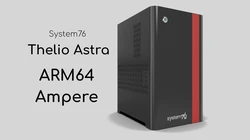System76 Unveils the Thelio Astra ARM64 Ampere-Powered Desktop Computer
The System76 Thelio Astra is an ARM64 machine designed for developers working on autonomous vehicles (AV), automotive safety systems (ADAS), and software-defined vehicle (SDV) development, for native testing and simulation on the same architecture as ARM-based automotive ECUs (Electronic Control Units).
Under the hood, Thelio Astra is powered by a 128-core Ampere Altra AArch64 (ARM64) processor running at 3.0 GHz clock speed and an NVIDIA RTX 6000 Ada graphics card, and can be configured with up to 512GB 8-channel DDR4 3200 MHz ECC memory and 8TB PCIe 4.0 M.2 NVMe storage.
Two More:
-
System76 and Ampere look to drive innovation in automotive tech with new Arm-powered Linux desktop
Linux computer manufacturer System76 has partnered with Ampere, the chipmaker founded by former Intel President Renée James, to launch the Thelio Astra - a developer desktop built for autonomous vehicles (AV), advanced driver-assistance systems (ADAS), and software-defined vehicles (SDVs).
This new workstation is built around Arm64 architecture, using Ampere Altra processors, to provide developers with native Arm-based testing, reducing the need for inefficient Arm emulation on x86 systems.
Thelio Astra offers the automotive industry a way to achieve faster, more efficient development on architecture identical to that found in automotive electronic control units (ECUs).
System76 Thelio Astra Combines Linux With a 128-Core ARM CPU
System76 sells many desktop and laptop computers built for Linux, from high-end workstations to affordable laptops. The company has now revealed its first ARM-powered desktop, and it might be a first in the computer industry.
System76 has announced the Thelio Astra, a desktop workstation powered by a 128-core ARM-based Ampere Altra processor, instead of a more typical x86-based Intel or AMD processors. It can be configured with up to 512GB DDR4 memory, an NVIDIA RTX 6000 Ada GPU, 8GB of NVMe storage, and dual 25 Gigabit Ethernet.
Linuxiac:
-
System76 and Ampere Unveil Thelio Astra
System76, a leading US-based manufacturer of Linux computers, has partnered with chipmaker Ampere to unveil Thelio Astra, an arm64 developer desktop designed for autonomous vehicles, advanced driver-assistance systems, and software-defined vehicle development.
Leveraging Ampere’s Altra processors enables automakers to bring their vision of self-driving vehicles closer to reality through arm-native development.
Additionally, System76 provides lifetime in-house support from a team of production, QA, mechanical engineers, software engineers, and support technicians based under one roof at its Denver facility.
Original Post:
-
System76 and Ampere® pioneer custom-built Thelio Astra arm64 developer desktop
System76, the leading US-based manufacturer of Linux computers, has collaborated with chipmaker Ampere to create Thelio Astra, an arm64 developer desktop for autonomous vehicle (AV), automotive safety systems (ADAS), and software-defined vehicle (SDV) development. Software development, testing, and simulation natively on the same architecture as arm-based automotive ECUs is faster, cost-effective, consumes less power, and promotes safer roads with smarter prototypes.
Linux Magazine:
-
System76 Unveils an Ampere-Powered Thelio Desktop » Linux Magazine
There's a new machine in the System76 Thelio lineup geared toward developers of autonomous vehicles (AVs), artificial intelligence, and STEM. The Thelio Astra marks the first-ever desktop PC that is purpose-built for AV development.
The Thelio Astra ARM64 Ampere-powered desktop computer comes with a 128-core Ampere Altra AArch64 (ARM64) CPU that has a 3.0GHz clock speed, an NVIDIA RTX 6000 GPU, and can be customized with a staggering 512GB, 8-Channel DDR4 3200 MHz EEC RAM. Additionally, you can spec the system out with an 8 TB PCIe 4.0 M.2 NVMe drive.
According to the System76 website, the Thelio Astra can help "eliminate surprise bugs that emerge from emulation. Native ARM64 development offers the premium package, delivering quick iteration, smarter prototypes, and safer streets on custom-built hardware."

